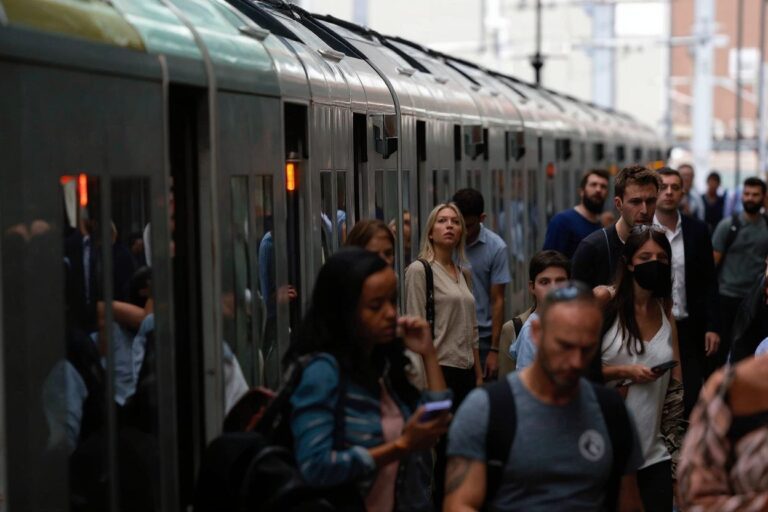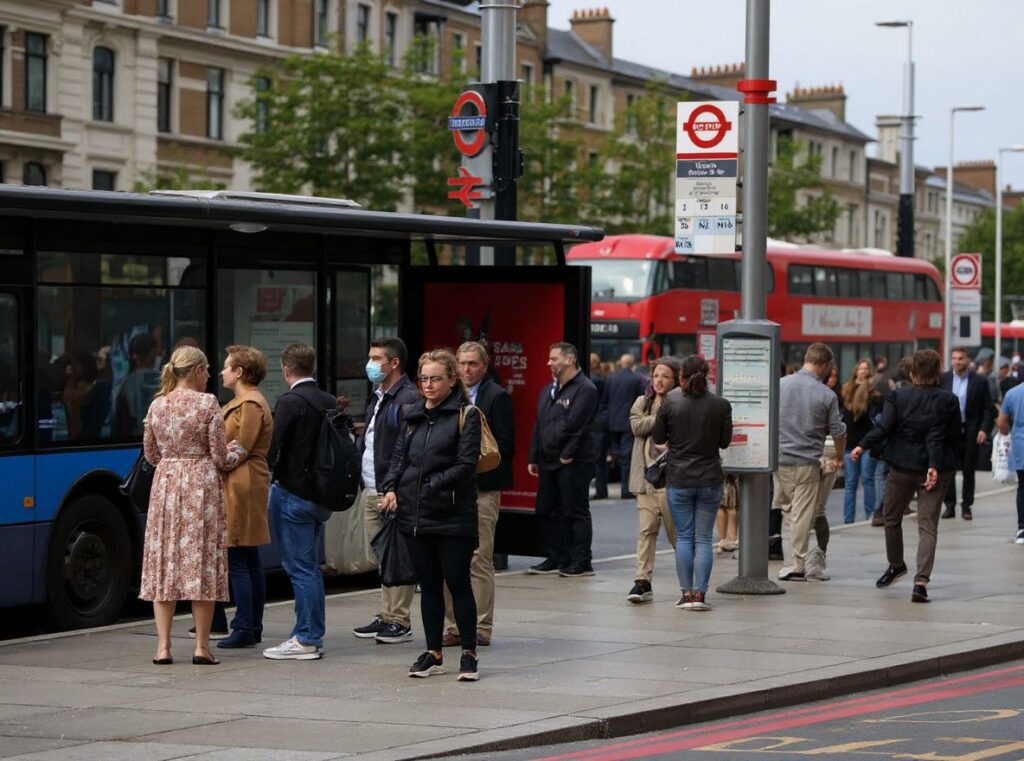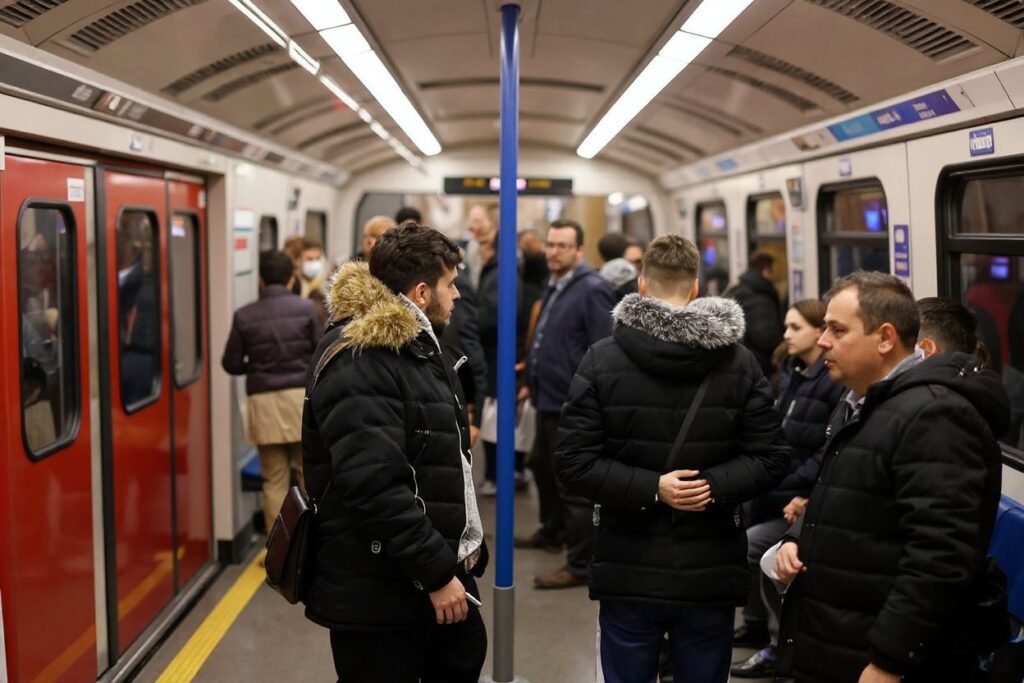
What’s the difference between the national rail and national express? What is an Oyster card and how do I use it? Is it cheaper to book train tickets online or at the ticket office? What on earth is a travel card?
If you’ve just moved to the UK, you might be asking these questions. As one of the most popular study destinations in the world, the UK attracts learners and high-skilled workers from far and wide to its shores. Because of this, the country has set up relatively friendly systems and processes for incoming students, skilled workers and tourists.
However, many students find themselves perplexed by UK transport systems at first — and for good reason. While it has a decent transport system, it can be confusing to switch between trains, buses and trams. This is especially true if you’re a student in London and have to add the Underground, Overground and River Bus services to the mix.
 An image of commuters waiting for a bus in London.
An image of commuters waiting for a bus in London.
The national rail, bus system and tube explained
The UK has a wide and vast public transport system. These tend to be standard across districts, but certain larger cities — such as London — have their own systems on top of nationwide transport.
Generally, you can expect to use the following as a student in the UK:
National rail
The national rail is the UK’s country-wide train system. You would likely use the national rail if you’re travelling between cities as it is faster than taking a coach or tram. Some larger cities may require you to use the national rail to navigate larger distances, as well.
Because of this, the national rail tends to be a more expensive mode of travel. You can purchase tickets online through the national rail website or app, at the train station, or through a third-party app. Prices tend to be the same no matter how you make your purchase, but booking a ticket for off-peak travel will be cheaper than peak travel times.
Buses
This is likely to be the cheapest mode of travel for a student in the UK. Most cities and towns will have their own bus systems that you can use to travel. You’d likely use buses to travel between your university and accommodation, to town centres, or to restaurants.
However, buses tend to be quite slow. It may not be the best option if you’re in a rush, as you’d have to brave traffic — especially during peak hours. You can purchase most bus tickets on from your driver, or in cities such as London, use your Oyster card or contactless card.
Trams
Trams are another common form of transport in the UK. These run along tracks on both public roads and other segregated routes. They can be found in most major cities, including Edinburgh, London, Manchester, Nottingham, Sheffield and Blackpool.
Tram prices are usually on par with the cost of taking a bus. However, this may vary by city. Tickets can be purchased at ticket offices or online.
Coaches
Coaches are used for travelling between cities, towns or from airports. These are larger buses equipped to travel longer distances, with better facilities and more comfortable seating. Some popular coach providers include the National Express and Megabus.
Coaches are cheaper than taking the national rail. However, they may take several hours longer, as you would be travelling on roads and highways. Tickets can be purchased online, and the earlier you book, the cheaper they tend to be.
London Underground
Also known as the tube system, the London Underground is the city’s most commonly used mode of travel. These link different neighbourhoods, districts and areas in London in a more effective manner, allowing you to travel between zones as smoothly as possible.
Fares depend on the hour of the day but generally remain low for travellers. Be sure to get an Oyster card — which is dispensed at tube stations — or use your contactless card to navigate the London Underground.
There are other modes of travel in the UK, such as the Thameslink, River Bus and more. The more you travel in the UK, the more familiar you’ll become with its different transportation systems.
 London's tube system can get quite busy during peak hours, so plan your travel accordingly.
London's tube system can get quite busy during peak hours, so plan your travel accordingly.
Apps to help you navigate UK transport
One way to ensure you don’t get lost travelling in the UK is by downloading a transport app. These will give you clear instructions on where to go, which stop to get off at and walking directions. Others may also help you book tickets or taxis.
These are the most useful apps to download:
- Google Maps is the most reliable transport app globally. It is useful to map out your journey, plan future trips and explore new places.
- Citymapper gives you simple, clear instructions on using trains, buses and the London tube. Its easy-to-use interface makes it popular with tourists and students everywhere.
- Trainline UK is a great app to book train tickets at cheaper prices. It has a simple interface as well, helping you understand the complex train system in a clearer manner.
- Uber is an essential app for taxi-hailing services. Prices tend to be lower than normal taxis, many of which charge double or triple the cost of an Uber. It is available in most major cities in the UK.
You can also follow Transport for London (TfL) on Twitter for updates on train and bus disruptions in the city.
 Pedestrians using the national rail at King's Cross station, London.
Pedestrians using the national rail at King's Cross station, London.
Student discounts and benefits
Finally, you should be aware of the various discounts and benefits you have access to as a student. These depend on the city you’re living in. However, most student-friendly areas, especially university campuses, will have their own set of discounts to keep transport prices low.
Students at individual university campuses can ask their dedicated union officers for more information.
If you’re planning on travelling outside your campus, or live in a larger city, you should consider getting these:
- A National Railcard. These can be used when purchasing national rail tickets nationwide. The most common railcards for students are the 16-25 Railcard and 26-30 Railcard, which give you a third off tickets for a year. Other railcards are available according to your needs, such as those for disabled persons, veterans, and more.
- An 18+ Student Oyster card. If you’re 18 and over and living in a London borough, you’re able to purchase a Student Oyster card. These will give you a 30% discount on adult-rate Travelcards and Bus & Tram Pass season tickets.










